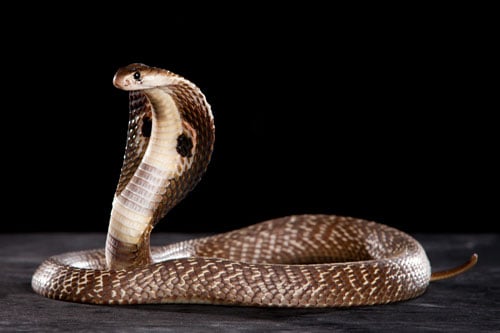With more than 200 species of snakes in Thailand, it’s possible that you will encounter one at some point while living here. Even though snakes are more abundant in rural areas, the Bangkok Fire Department received over 30,000 calls last year from people needing help removing snakes.
A bite from a venomous snake can turn out to be deadly, so it’s well worth knowing how to avoid snakes, and what to do in case a bite occurs. And that’s especially true for parents, as children tend to be at greater risk of being bitten because they spend more time outside — and a child’s smaller size can make a snake bite more dangerous.
How to avoid snake bites
Most snakes are harmless and tend to stay away from people. However, there are several venomous snakes found in Southeast Asia that people should avoid:

- Cobra: You will seldom find a cobra roaming city streets, since they prefer rural living in farming areas and in jungles. Cobras are easy to recognize by the hoods they display as they prepare to strike.
- Krait: These snakes are usually found near coastal areas and forests, but occasionally they have been spotted in more populated areas. Kraits are identifiable by their stripes, either yellow and black, or black and white.
- Viper: Vipers tend to live near farms and forests. They are most active at night, so be sure to carry a flashlight if you are in an area where they are known to be. Viper snakes are known to stand their ground rather than retreat, which increases the chances of being a bite victim.
Snakes tend to stay hidden from view, so they are difficult to see. Areas with long grass are best avoided; if you must pass through long grass, use a branch or a stick to tap the ground in front of you, to give any snakes plenty of notice to enable them to move away. If you plan to hike in an area known to have snakes, be sure to wear boots and long pants to protect against snakes hiding under rocks. Always stay aware of where you are walking, and if you come in contact with a snake, do not approach it or do anything to aggravate it.
In the event of a snake bite
According to the World Health Organization (WHO), most traditional methods of first aid are not advisable, as they tend to do more harm than good. After a bite, do as follows:
- Call Thailand’s emergency ambulance hotline at 1669.
- Be aware that swelling or change in color in and around the bite area likely indicates the snake was venomous.
- Keep the bite victim calm. Restrict the victim’s movement and keep the affected area lower than heart level.
- Remove rings and other tight, constricting items of clothing.
- Monitor the victim’s pulse and breathing, and look for paleness or indications of shock.
- Take note of any characteristics that may help identify the type of snake, as this will be helpful to the medical staff determining the proper antidote.
- AVOID making direct contact with the wound.
What to expect at the hospital
One of the priorities for the medical staff is determining the species of the snake, and if it is venomous, to ensure the correct anti-venom is administered. In the case of a venomous bite, if the doctor determines that anti-venom is necessary, an order is placed with the designated hospital that stocks anti-venom for the area. Chulalongkorn University operates a snake farm and serves as a primary anti-venom supplier for Bangkok-area hospitals, including Bumrungrad International Hospital.
If bitten in Bangkok: In case you or someone you are with suffers a snake bite in Bangkok, consider going directly to King Chulalongkorn Memorial Hospital located on Ratchadamri Road, across from Lumpini Park. If that is not an option, contact Bumrungrad International Hospital's Emergency Center at +66 2011 5222 for help coordinating emergency treatment or evacuation.
For more information please contact:
Last modify: September 14, 2023